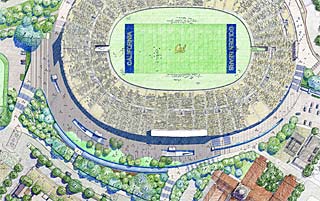UC Berkeley Web Feature
 This cutaway artist's rendering shows how the Student-Athlete High Performance Center would be situated below a plaza adjacent to Memorial Stadium. |
Campus officials declare 'a major victory for our students' in judge's ruling on student-athlete center
BERKELEY – University of California, Berkeley, officials said tonight (Wednesday, June 18) that the campus has prevailed on virtually every challenge raised in a lawsuit that sought to halt construction of the university's planned Student-Athlete High Performance Center adjacent to its historic California Memorial Stadium.
"We are thrilled that the judge concluded that state seismic law will allow the Student-Athlete High Performance Center to be built on the site," said Vice Chancellor for Administration Nathan Brostrom at a campus press conference. "This is a major victory for our students." (Read Brostrom's full statement)
 The Student-Athlete High Performance Center, to be constructed just west of Memorial Stadium, is one component of the Southeast Campus Integrated Projects. |
"This project is and has always been about our students. The judge's decision today provides us with a clear roadmap, a clear path for expeditiously getting this project underway," said Athletic Director Sandy Barbour. "It's really a great day for our student-athletes and the opportunity for them to have safe and quality conditions for success."
"The university has prevailed on every single issue in this suit except for two simple, very technical issues," said the university's attorney, Charles Olson. "The judge clearly indicated that the Student-Athlete High Performance Center can be built on the site. This is a 99.9 percent victory on the legal issues. We will quickly respond to the court on the two minor issues," he said.
Olson said Alameda Superior Court Judge Barbara Miller's 129-page ruling found that, as a whole, the student-athlete center building does not violate state earthquake safety laws or state environmental laws. He said the judge rejected 11 of the plaintiffs' 12 major arguments that the university had violated the California Environmental Quality Act. The one issue that went against the university was related to a finding involving proposed later phases of the larger project, not the student center building.
Three plaintiffs - the City of Berkeley, the Panoramic Hill Association, and the California Oak Foundation — had challenged UC Berkeley's environmental and seismic review of the Southeast Campus Integrated Projects program.
 In this site plan, the new training center is located at the lower left, outside the northwest walls of the stadium. |
Olson said "the judge was silent" in this evening's ruling on the fate of the injunction and that he expected that it would be clarified in the next day or two.
When asked about when the campus could begin construction, Brostrom said, "As soon as the injunction is released. We have not been idle" and are prepared to go ahead quickly, he said. He estimated construction would take about two and a half years.
Olson said that he expected a "very short process" to provide the judge answers to the two technical issues that remain. "Judge Miller should be able to rule quickly." The judge has asked that filings from both sides be submitted by the end of June.
Judge Miller's full ruling is available on the Alameda Superior Court's website. (Java required). A searchable PDF version is also available on the NewsCenter site (4.1 Mb).

